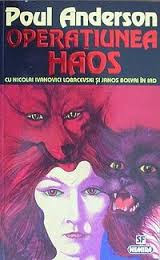Because SM Stirling's Nantucket, Volume II, has not yet arrived by post, I browsed through the NESFA Collected Short Works of Poul Anderson volumes that I have, started to reread "Operation Afreet," then realized that I do not remember the course of this story. This means that it is possible to reread Operation Chaos and find new details to blog about. Blogging requires reading or rereading in a particular frame of mind, being prepared to enter into the fictional world rather than just skim across its surface. It is more like a virtual reality than a linear narrative.
I do not need to revisit accounts of the experience of a man becoming a wolf. See here and here.
Why do we read narratives as fantastic as this one? We do not believe in werewolves. But we have imagined them and can appreciate accounts of what they would be like. Without fiction, we would not be who or what we are. And some of the supernatural elements of fantasies are believed by some of us. The Christian Heaven and Hell exist in the goetic universe.
Fiction requires willing suspension of disbelief. Some religions require willing belief. This is a difference of degree, not of kind.

7 comments:
Kaor, Paul!
I'm not sure I agree with your last sentence. I agree good fictions requires willing suspension of disbelief if we are to fully enjoy the story. But a novel is still a FICTION. And I believe the Bible teaches revealed TRUTHS. I would argue a novel has to be different in kind from an actually true thing.
Sean
Sean,
A fiction is by definition not a truth but I thought that willing belief and willing (suspension of dis)belief were similar.
Paul.
Kaor, Paul!
Well, I do concede they share the "willing" bit!
Sean
Sean,
But belief and suspension of disbelief are on a spectrum?
Paul.
Kaor, Paul!
I think I understand your point. But "belief" and "disbelief" still seem like opposites to me.
Sean
Sean,
Yes, they are opposites but to suspend either is to move closer to the other.
Paul.
Kaor, Paul!
That I can understand and agree with!
Sean
Post a Comment